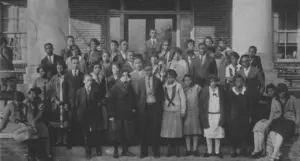The Samuel DuBois Cook Center on Social Equity is a scholarly collaborative that studies the causes and consequences of inequality and develops remedies for these disparities and their adverse effects.

North Carolina College for Negroes, ca. 1920. Image courtesy of Durham Historic Photographic Archives, North Carolina Collection, Durham County. Featured in "Durham's Black Wall Street" exhibit by the Cook Center.
Concerned with the economic, political, social and cultural dimensions of uneven access to resources, opportunity and capabilities, Cook Center researchers take a cross-national comparative approach to the study of human difference and disparity.
Considering both global and local shortcomings, Cook Center scholars not only address the overarching social problem of general inequality, but they also explore social problems associated with gender, race, ethnicity and religious affiliation.
Based on this research, the Cook Center seeks to offer policy solutions addressing inequality and its effects. Researchers critically examine measures with these goals in mind:
- Improving social mobility
- Expanding quality education
- Guaranteeing well paid employment
- Ensuring wide access to public health and medical services
- Enhancing opportunities for wealth and asset building
- Assuring safe and fair participation in the political process
Cook Center researchers compare the human experience of disparity in the U.S. and beyond, with a focus on economic, political, health and cultural disparities. Their research provides an assessment of inequitable access to resources and opportunities around the world. Our scholars examine and evaluate a range of topics, including:

Historic downtown Durham, NC.
- Mechanisms that establish and sustain patterns of dominance and subordination across peoples, countries, and regions;
- Constructions of identities and nationalisms;
- Patterns of inclusion in or exclusion from preferred positions and statuses;
- Cultural products and vernacular expressions that derive from, depict or critique inequality; and
- Narratives and outcomes that arise from existing public policies and assist in the development of new programs and policies designed that promote greater social equity.

